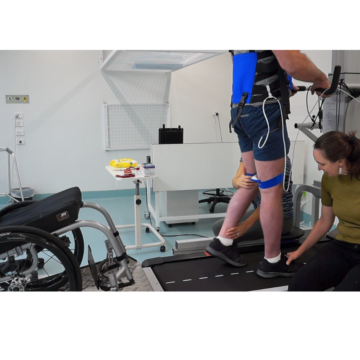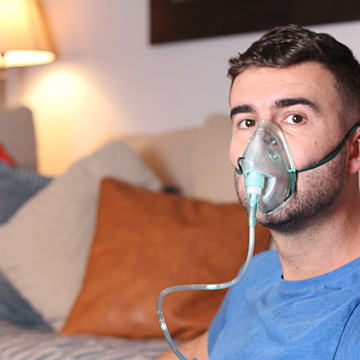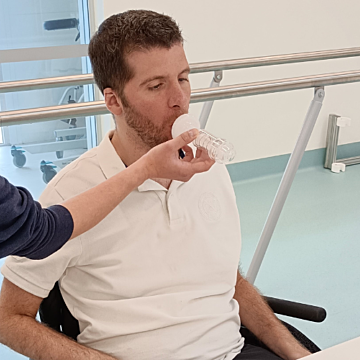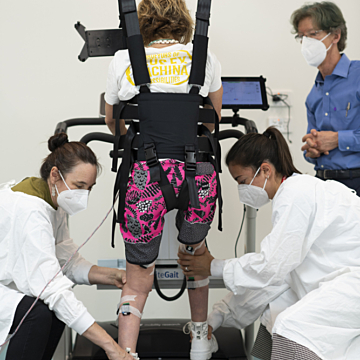Research Project
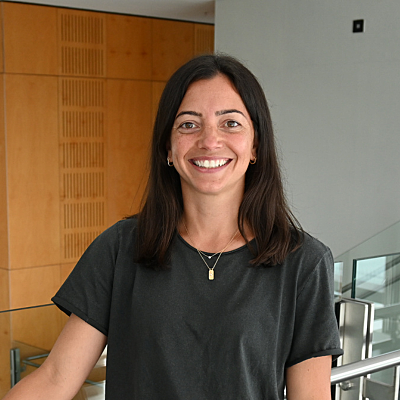
Elizabeth Bye
Current Appointments
Research FellowKey Research Areas
Elizabeth (BAppSc PT, PhD) trained as a physiotherapist at the University of Sydney and worked as a clinician for almost 10 years at Prince of Wales Hospital where she specialised in spinal cord injury (SCI) rehabilitation. She obtained her PhD from the University of Sydney in 2020 completing her research at NeuRA and the Kolling Institute.
Elizabeth now works as a Research Fellow in the Spinal Cord Injury Research Centre (SCIRC) at NeuRA. Elizabeth's research investigates neuromodulation in SCI. She is part of a team currently conducting three different clinical trials exploring the effects of transcutaneous spinal cord stimulation on various outcomes such as walking ability, hand and arm function and breathing in chronic SCI.
Publications
2025 Nov
Physiotherapy interventions for the respiratory management of people with spinal cord injury: recommendations from an Australian and New Zealand clinical practice guideline
View full journal-article on https://doi.org/10.1038/s41393-025-01116-7
2025, 01 Feb
Differential effects of stimulation waveform and intensity on the neural structures activated by lumbar transcutaneous spinal cord stimulation
View full journal-article on https://doi.org/10.1152/jn.00266.2024
2023
Encouraging responsible reporting practices in the Instructions to Authors of neuroscience and physiology journals: There is room to improve
View full journal-article on http://www.scopus.com/inward/record.url?eid=2-s2.0-85151370113&partnerID=MN8TOARS
2023
Transcutaneous spinal stimulation in people with and without spinal cord injury: Effect of electrode placement and trains of stimulation on threshold intensity
View full journal-article on http://www.scopus.com/inward/record.url?eid=2-s2.0-85160895248&partnerID=MN8TOARS
2022 Jun
Transcutaneous spinal cord stimulation combined with locomotor training to improve walking ability in people with chronic spinal cord injury: study protocol for an international multi-centred double-blinded randomised sham-controlled trial (eWALK)
View full journal-article on https://doi.org/10.1038/s41393-021-00734-1
2021
MRI-based Measurement of Effects of Strength Training on Intramuscular Fat in People with and without Spinal Cord Injury
View full journal-article on http://www.scopus.com/inward/record.url?eid=2-s2.0-85105973617&partnerID=MN8TOARS
2021
The inter-rater reliability of the 13-point manual muscle test in people with spinal cord injury
View full journal-article on http://www.scopus.com/inward/record.url?eid=2-s2.0-85074814586&partnerID=MN8TOARS
2019
A preliminary investigation of mechanisms by which short-term resistance training increases strength of partially paralysed muscles in people with spinal cord injury
View full journal-article on http://www.scopus.com/inward/record.url?eid=2-s2.0-85065979860&partnerID=MN8TOARS
2019
Abdominal functional electrical stimulation to assist ventilator weaning in critical illness: a double-blinded, randomised, sham-controlled pilot study
View full journal-article on http://www.scopus.com/inward/record.url?eid=2-s2.0-85070533803&partnerID=MN8TOARS
2017
Strength training for partially paralysed muscles in people with recent spinal cord injury: A within-participant randomised controlled trial
View full journal-article on http://www.scopus.com/inward/record.url?eid=2-s2.0-85001544041&partnerID=MN8TOARS
